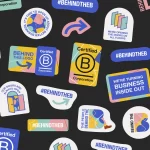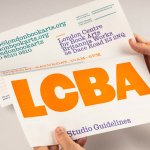
B Corps Go Beyond
Written by Mark Paton Posted 2 March 2023
Creative thinkers have always struck me as idealists. A group of people who can utterly immerse themselves in a new idea or a way of thinking. So it doesn’t come as a surprise that more and more creative companies are applying for B Corp certification.
Put simply, B Corp is a movement that aims to make business a force for good: the B stands for Beneficial. And there seems to be momentum building. There are now over 6300 globally, and over 1,200 B Corps in the UK alone – up from 564 at the end of 2021. Even with my designer’s maths skills, I make that more than a 100% increase year on year in the UK.
We received our certification last summer and judging by the steady stream of questions from friends and peers at other studios, I’d say those figures are only on the up. In the last few months alone we have seen a interesting mix of creative studios both large and small certifying.

B Corp first arrived on our radar back in 2018. We were working with Ben & Jerry’s, who, along with Patagonia, were some of the first high profile companies to adopt this way of thinking about their impact. At that point, it seemed like an unobtainable standard that only applied to those big American businesses with the resources to make it a reality.
Fast forward to 2020. The speedbumps and distractions thrown at us as a business brought all the values of B Corp back to the forefront of our minds, and so our application began. In the end, our decision to go for B Corp certification was a collective one – an ambition identified by the whole studio and only made possible as a team working together.
The cynics amongst you will be asking the critical question is: why bother?
There are a bunch of tangible reasons to consider it. Take your pick:
It makes you think much harder about what you are pouring your time in to.
We are forced to apply a much more critical lens to the projects we choose to work on. New projects are now ruthlessly judged on criteria linked back to the starting point – making business a force for good – as much as the commercial opportunity.
Our challenge from here on out is to find those clients and projects that allow us to apply our years of experience to the brands, services, people and organisations that we feel are contributing good ideas to the world. So little of what is happening in politics reflects our ambitions but now, the power to do business better is in our hands.

Decisions are easier.
Once committed to the ideals of B Corp, it really simplified the choices we make as businesses. Revisiting our policies, subscribing to a carbon capture programme with Climeworks, and adopting a 4.5 day week were all made much easier because they were judged in the context of a much bigger aspiration. What in previous years might have felt like a sacrifice, felt like the opposite: an enrichment. Rather than dwelling on the minutiae of implications, we just knew it made sense to get on with it.
It is a way to learn.
As many designers do, I co-founded a company without any particular business or management experience. Beyond the excitement of working for ourselves, I had no idea of the nuts, bolts, and legalities of running a company. So even just the application process for B Corp – the act of filling out their questionnaire – taught me so much about a more progressive and rounded way of thinking about running a business. As a result, I now have a much better understanding of the conceptual foundations of our company.

It was one of the few moments in my working life where I actively spoke to other agencies and clients for advice – something we should all do much more of. The effect of meeting likeminded companies who were further ahead in their application, like our clients at Two Drifters and L.A. Brewery, gave us a small insight into the collective support network that the B Corp movement is becoming.
Regardless of the outcome – certification or not – it is worth applying and working through the application process for all that can be learnt about progressive ways of thinking.
As the headlines on Brewdog attest, a certification achieved really isn’t the end of the story, and we are conscious that as the movement grows, the criteria should develop to become harder and harder to meet. And that is another big part of the appeal. As an idealist I like how B Corp has the potential to develop and build over time.
The best advice I’ve ever been given about presenting, is to believe what you are saying, and B Corp provides a framework to solidify and commit to those beliefs.

